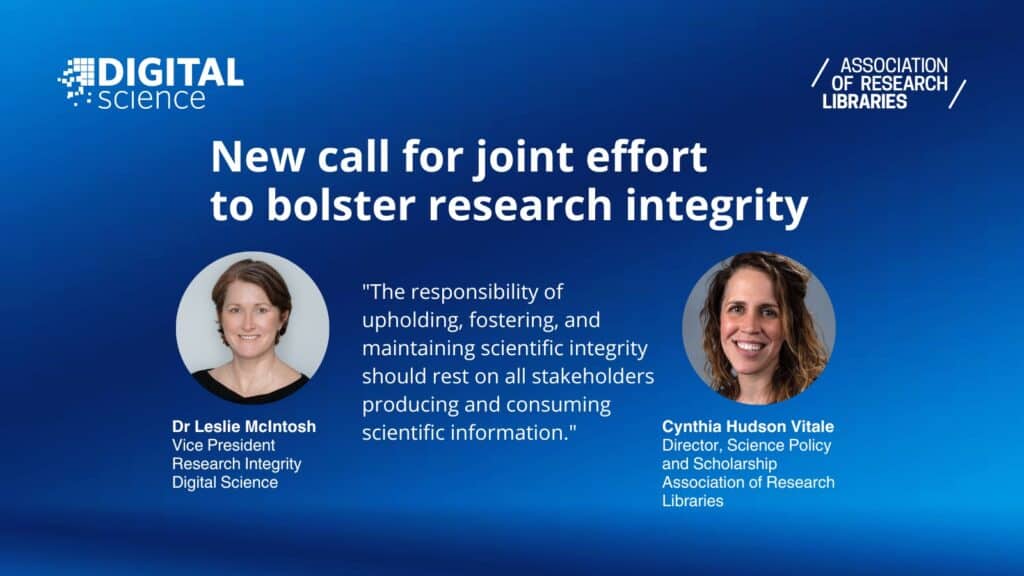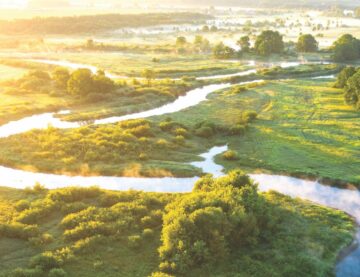New call for joint effort to bolster research integrity
Paper outlines roles for every part of the research landscape to help improve trust in research – including journalists
Thursday 17 August 2023
Who’s responsible for upholding research integrity, mitigating misinformation or disinformation and increasing trust in research? Everyone – even those reporting on research – says a new article published by leading research integrity experts.
In their paper published in the journal Frontiers in Research Metrics and Analytics, Dr Leslie McIntosh (Vice President Research Integrity, Digital Science) and Ms Cynthia Hudson Vitale (Director, Science Policy and Scholarship, Association of Research Libraries) call for improved policies and worldwide coordination between funding bodies, publishers, academic institutions, scholarly societies, policy-makers and the media.
“Scientific reputation requires a coordinated approach across all stakeholders,” they write.
“The burden of improving scientific integrity most naturally falls on those individuals conducting research; yet their work does not occur in a vacuum… the responsibility of upholding, fostering, and maintaining scientific integrity should rest on all stakeholders producing and consuming scientific information.”

Dr McIntosh says this sentiment is echoed by Dr Holden Thorp’s recent comments in Science when writing his editorial about Generative Approach to Research Integrity.
In their article, Dr McIntosh and Ms Hudson Vitale say: “Systematic change comes when all players in the ecosystem work toward a common goal. Organizational stakeholders must coordinate efforts to fortify science integrity: making science better, and better science easier.”
They say a global shift in culture will lead to advances in research integrity. To do this, responsibility must be shared, with “changes needed at the macro level in the scientific ecosystem”.
“The current ‘culture’ of science may be collaborative at the research level, yet is often disparate at the ecosystem level… disparate stakeholders and processes across the research integrity ecosystem need to increase coordination and communication,” they write.
Dr McIntosh and Ms Hudson Vitale have produced a table that summarizes the roles to be played and the changes required of each of the key stakeholder groups. This includes:
Funders – Funding agencies “hold critical keys in fortifying the ecosystem”; researchers and academic institutions, which are motivated to earn funding for research, will respond to agency policy requirements, including a tightening of research integrity.
Publishers – “…must further their push for research transparency and move beyond just data into the sharing of complete methods, interactive models, code, and software.”
Scholarly societies – Global coordination between societies and other stakeholders is needed. “Through coordination with other societies, publishers, and researchers, scholarly societies can support graduate students, faculty, and researchers in this critical research skill of the education and implementation of transparently reporting research. From an infrastructure perspective, this would be invaluable.”
Academic research institutions – They should assess their services available to researchers, and consider additional ways to support responsible collaboration on research integrity, while offering solutions to streamline and alleviate any unnecessary demands on researchers.
Journalists and Media – “Journalists are an integral part of the new public and scientific discourse necessary for a well-informed community,” Dr McIntosh and Ms Hudson Vitale write.
“Given the important role that journalism has in shaping and influencing public discourse (e.g., COVID pandemic public discourse), the integrity and factualness of news articles is critical to uphold a well-informed community and create checks on federal and local policies.
“News organizations and media platforms (including and especially social media) must support the resources and initiatives that can enhance trust in science communication and make journalism a trusted source of scientific information.”
Policy-makers – “More policy-makers must establish policies to increase trust and uphold the research integrity of science, and then follow up those policies with assessments, modifications, and refinement to support the research enterprise.”
See their full paper here: https://doi.org/10.3389/frma.2023.1134082
About Digital Science
Digital Science is a technology company working to make research more efficient. We invest in, nurture and support innovative businesses and technologies that make all parts of the research process more open and effective. Our portfolio includes admired brands Altmetric, Dimensions, Figshare, ReadCube, Symplectic, IFI CLAIMS Patent Services, Overleaf, Writefull, OntoChem, Scismic and metaphacts. We believe that together, we can help researchers make a difference. Visit www.digital-science.com and follow @digitalsci on Twitter or on LinkedIn.
Media contacts
Simon Linacre, Head of Content, Brand & Press, Digital Science: Mobile: +44 7484 381477, s.linacre@digital-science.com
David Ellis, Press, PR & Social Manager, Digital Science: Mobile +61 447 783 023, d.ellis@digital-science.com



